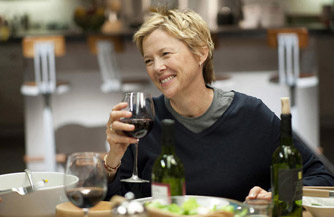He Said: The Kids Are All Right
By Jamie D. Ruccio
August 11, 2010
BoxOfficeProphets.com

Since then there has been much incremental social change. One such change is the slow acceptance of homosexuality. One of the current social debates now is the place of a family within homosexuality. Homosexuals, like the rest of humanity, yearn for the same basic satisfaction of emotional needs. There is a need to be loved, to love, to improve one's character through time and experience and then to pass that on to someone else. And yet, it's tough. People are messy and make mistakes that affect other people they love. This is the premise of the wonderfully executed The Kids are All Right.
The Kids are All Right is about Nic and Jules (played by Annette Bening and Julianne Moore), a lesbian couple of 20 years who through artificial insemination have two late teenage children. The children, Joni (named after Joni Mitchell and played by Mia Wasikowska) and Laser (played by Josh Hutcherson) quietly seek out their donor-father, Paul (played by Mark Ruffalo). The introduction of his presence into the family is then catalyst for the conflict in the rest of the movie.
The above synopsis, however, is too superficial and blithe for what actually happens. The Kids are All Right isn't really about what happens to a family headed by a lesbian couple. It is entirely about what happens to a loving, stable family when confronted by difficulty, whatever it may be. There is not a single moment of the movie that feels as though it is proselytizing a particular social view point. It does simply take the position that this family, while constructed around a minority couple, is worthy and valid and attempts to show that like all other families, it faces challenges.
Both Nic and Jules, again like any long standing couple, have their own share of scars from the relationship. There are misconceptions about the other, old insecurities and faults that don't quite raise to the level of crisis, all of which are either suppressed or confronted to varying degrees. Both Bening and Moore's portrayals are subtle and infused with a sense of truth. There are no clichés. These are simply two normal, middle aged adults with children they love who are struggling with the weight of their own faults. Jules questions her professional decisions and feels inadequate and unfulfilled. Nic, focused on her career, is perhaps distant to her and the rest of the family.
Mark Ruffalo as Paul is the children's sperm donor and therefore biological father. He is the catalyst that triggers the resulting conflict throughout the movie. He is a sympathetic, emotional drifter but he is almost secondary in The Kids are All Right. While some of the movie deals with his emerging relationship with his children, who must suddenly confront the very alien concept of a male as a figure for possible guidance, he is largely incidental. His presence serves as the means by which the family is put under load. To the script's credit, it avoids the trappings of easy over emotionality. This isn't the central conflict off the movie but merely one of a few. Paul is mostly a benign character played with a soft charm by Ruffalo, which only occasionally veers towards a homage to The Big Lebowski's The Dude (if I didn't know any better I'd swear this was intentional as one character remarks that he repeats things he hears from others although he only does it once).
One of the nice things about The Kids are All Right is that they are. The title almost suggests this is a forgone conclusion. The movie is really about something else entirely. The movie explores their feelings about meeting their biological father and thus back-doors the true feelings about being part of a non-traditional family but it's all done with great care and authenticity. Wasikowska and Hutcherson display tremendous acting ability, aided by the script, in portraying children growing into their adult world.
What I enjoyed about The Kids are All Right is that the resolutions don't feel neat, contained and with a positive message. They aren't necessarily fully rewarding to the characters, but like many resolutions, they will do. Some conflicts remain, damage is still done and yet the family and the bonds they have endure. We sense that we're merely peering in to their lives for a brief moment and that they will continue on long after we've left. We sense their goodness, affection and love for one another and are reasonably assured that they will succeed but like reality, they may not.
The United States is finally beginning to face its next great social challenge, the full integration of homosexuality. A country long proud of it's heritage, of accepting anyone willing to abide by its professed values of equality, is beginning to allow a minority its place. Brokeback Mountain was a devastating portrayal of yearning and TV shows like "Glee" begin to reveal the turmoil of coming to terms with one's sexuality and how that affects others in the family. The Kids are All Right takes its place amongst other portrayals of normal homosexual life in showing that they, much like the majority, struggle in the same way as all of us.